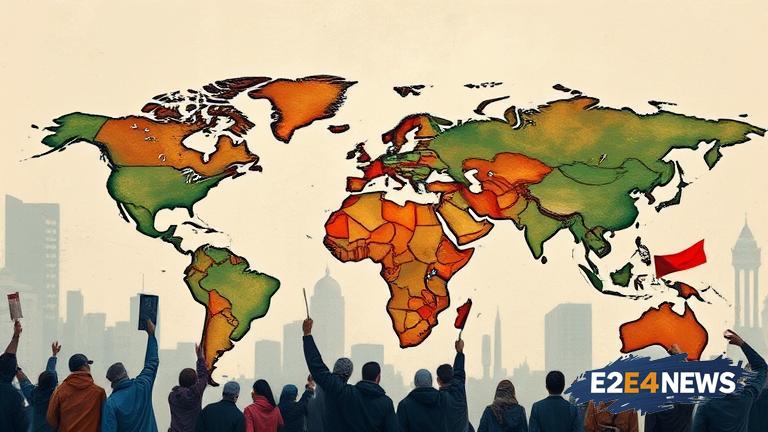The global economy is experiencing a period of significant instability, marked by rising trade tensions, anti-globalization sentiment, and a decline in international cooperation. The COVID-19 pandemic has accelerated these trends, with many countries imposing protectionist policies and tariffs on imported goods. The World Trade Organization (WTO) has warned that the global trade landscape is becoming increasingly fragmented, with a rise in trade restrictions and a decline in trade volumes. The US-China trade war has been a major contributor to this trend, with both countries imposing tariffs on each other’s goods and services. The European Union has also been affected, with the UK’s decision to leave the EU (Brexit) creating uncertainty and disrupting trade flows. The rise of anti-globalization sentiment has been fueled by concerns over job losses, income inequality, and the perceived negative impacts of globalization on local communities. Many people feel that globalization has led to the exploitation of workers, the erosion of social welfare systems, and the concentration of wealth among a small elite. In response, governments are increasingly turning to protectionist policies, such as tariffs and subsidies, to protect domestic industries and jobs. However, these policies can have unintended consequences, such as higher prices for consumers and reduced economic efficiency. The WTO has warned that the rise of protectionism could lead to a decline in global trade and investment, with negative consequences for economic growth and job creation. The International Monetary Fund (IMF) has also expressed concerns over the rise of trade tensions, warning that they could lead to a decline in global economic growth and an increase in poverty and inequality. Despite these warnings, many countries are continuing to pursue protectionist policies, with some arguing that they are necessary to protect domestic industries and jobs. However, others argue that these policies are misguided and will ultimately harm the global economy. The rise of anti-globalization sentiment has also been fueled by the perceived failures of globalization, including the financial crisis of 2008 and the subsequent austerity measures imposed by governments. Many people feel that globalization has led to the concentration of wealth among a small elite, while leaving behind the majority of the population. In response, there is a growing movement towards more equitable and sustainable forms of globalization, which prioritize social welfare, environmental protection, and human rights. This movement is being driven by civil society organizations, trade unions, and social movements, which are calling for a more just and equitable global economic order. The global economy is at a crossroads, with the rise of anti-globalization sentiment and protectionist policies threatening to undermine global trade and investment. However, there is also a growing recognition of the need for a more equitable and sustainable form of globalization, which prioritizes social welfare, environmental protection, and human rights. Ultimately, the future of the global economy will depend on the ability of governments and international institutions to respond to these challenges and create a more just and equitable global economic order. The world economy is facing a critical juncture, with the rise of anti-globalization sentiment and protectionist policies threatening to undermine global trade and investment. The COVID-19 pandemic has accelerated these trends, with many countries imposing protectionist policies and tariffs on imported goods. The WTO has warned that the global trade landscape is becoming increasingly fragmented, with a rise in trade restrictions and a decline in trade volumes. The US-China trade war has been a major contributor to this trend, with both countries imposing tariffs on each other’s goods and services. The European Union has also been affected, with the UK’s decision to leave the EU (Brexit) creating uncertainty and disrupting trade flows. The rise of anti-globalization sentiment has been fueled by concerns over job losses, income inequality, and the perceived negative impacts of globalization on local communities. Many people feel that globalization has led to the exploitation of workers, the erosion of social welfare systems, and the concentration of wealth among a small elite. In response, governments are increasingly turning to protectionist policies, such as tariffs and subsidies, to protect domestic industries and jobs. However, these policies can have unintended consequences, such as higher prices for consumers and reduced economic efficiency. The WTO has warned that the rise of protectionism could lead to a decline in global trade and investment, with negative consequences for economic growth and job creation. The IMF has also expressed concerns over the rise of trade tensions, warning that they could lead to a decline in global economic growth and an increase in poverty and inequality. Despite these warnings, many countries are continuing to pursue protectionist policies, with some arguing that they are necessary to protect domestic industries and jobs. However, others argue that these policies are misguided and will ultimately harm the global economy. The rise of anti-globalization sentiment has also been fueled by the perceived failures of globalization, including the financial crisis of 2008 and the subsequent austerity measures imposed by governments. Many people feel that globalization has led to the concentration of wealth among a small elite, while leaving behind the majority of the population. In response, there is a growing movement towards more equitable and sustainable forms of globalization, which prioritize social welfare, environmental protection, and human rights. This movement is being driven by civil society organizations, trade unions, and social movements, which are calling for a more just and equitable global economic order. The global economy is at a crossroads, with the rise of anti-globalization sentiment and protectionist policies threatening to undermine global trade and investment. However, there is also a growing recognition of the need for a more equitable and sustainable form of globalization, which prioritizes social welfare, environmental protection, and human rights. Ultimately, the future of the global economy will depend on the ability of governments and international institutions to respond to these challenges and create a more just and equitable global economic order.
